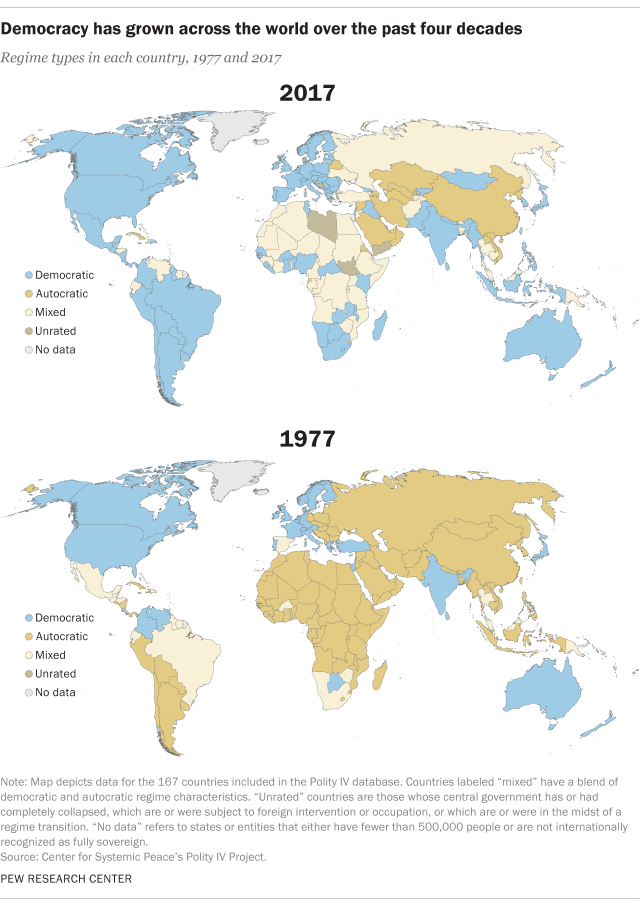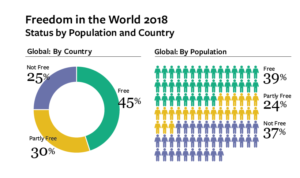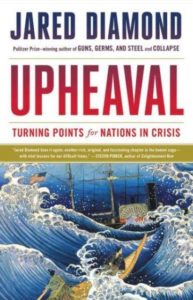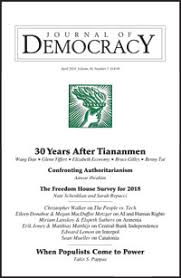
Anxiety over the future of democracy, the populist threat, authoritarian alternatives, growing illiberalism, and general democratic malaise may be misplaced, new research suggests.
Public support for democratic ideals remains strong, and by one measure, global democracy is at or near a modern-day high, according to the Pew Research Center’s Drew DeSilver.
“As of the end of 2017, 96 out of 167 countries with populations of at least 500,000 (57%) were democracies of some kind, and only 21 (13%) were autocracies. Nearly four dozen other countries – 46, or 28% – exhibited elements of both democracy and autocracy,” he writes. “Broadly speaking, the share of democracies among the world’s governments has been on an upward trend since the mid-1970s, and now sits just shy of its post-World War II record (58% in 2016),” drawing on the Center for Systemic Peace’s Polity IV dataset.
 “Polity’s democracy ratings are by no means the only ones out there, though because of differing methodologies they tell somewhat different stories. Freedom House, for instance, rates 86 out of 195 countries (44%) as ‘free,’ using criteria that include both political and civil rights,” DeSilver adds. “And though nearly half of the 167 countries in the Economist Intelligence Unit’s Democracy Index are considered to be some form of democracy, only 12% (20) are rated as “full democracies”; nearly a third (55 countries) are counted as ‘flawed democracies’ – including the U.S.”
“Polity’s democracy ratings are by no means the only ones out there, though because of differing methodologies they tell somewhat different stories. Freedom House, for instance, rates 86 out of 195 countries (44%) as ‘free,’ using criteria that include both political and civil rights,” DeSilver adds. “And though nearly half of the 167 countries in the Economist Intelligence Unit’s Democracy Index are considered to be some form of democracy, only 12% (20) are rated as “full democracies”; nearly a third (55 countries) are counted as ‘flawed democracies’ – including the U.S.”
Opportunities for Renewal
 Key democratic norms remained under threat in 2018, but there were also unexpected breakthroughs in Armenia, Malaysia, and Ethiopia, note Freedom House analysts Nate Schenkkan and Sarah Repucci. Even in a time of new threats to democracy, social movements around the world are expanding the scope of democratic inclusion, they write in The Freedom House Survey for 2018: Democracy in Retreat, an article for the National Endowment for Democracy‘s Journal of Democracy:
Key democratic norms remained under threat in 2018, but there were also unexpected breakthroughs in Armenia, Malaysia, and Ethiopia, note Freedom House analysts Nate Schenkkan and Sarah Repucci. Even in a time of new threats to democracy, social movements around the world are expanding the scope of democratic inclusion, they write in The Freedom House Survey for 2018: Democracy in Retreat, an article for the National Endowment for Democracy‘s Journal of Democracy:
A multigenerational transformation is taking place in securing the rights of women; of ethnic, sexual, and religious minorities; of migrants; and of people with disabilities—not least in places where these rights were already constitutionally enshrined. Authoritarian and antiliberal actors fear these movements for justice and participation because they challenge unfair concentrations of status and power. The transformation may still be fragile and incomplete, but its underlying drive—to make good on the twentieth century’s promise of universal human rights and democratic institutions—is profoundly important.
 Polarization is the greatest threat to democratic institutions, argues writer and historian Jared Diamond, author of “Upheaval: Turning Points for Nations in Crisis.” He likens nations in trouble to individuals going through a recovery, Bloomberg’s Peter Coy adds:
Polarization is the greatest threat to democratic institutions, argues writer and historian Jared Diamond, author of “Upheaval: Turning Points for Nations in Crisis.” He likens nations in trouble to individuals going through a recovery, Bloomberg’s Peter Coy adds:
For both, he says, there are 12 things to consider, including: admitting you have a problem, accepting responsibility, separating the problem from the rest of your life, getting help, learning from others, and being realistic about what can be done. Nations have slightly different considerations, among them a strong national identity that’s based on language, culture, or other factors, as well as core values, such as democracy.
“I lived in the Latin American country of Chile in 1967, the most democratic South American country. Democracy ended there by military coup d’etat as an outcome of political polarization,” Diamond tells NPR.
 Although the Polity data indicates that more countries are democratic than not, at least formally, that doesn’t mean people are happy with democracy in action, DeSilver observes:
Although the Polity data indicates that more countries are democratic than not, at least formally, that doesn’t mean people are happy with democracy in action, DeSilver observes:
In a Pew Research Center survey of 27 countries conducted last year, a global median of 51% said they were dissatisfied with how democracy is working in their country, while 45% said they were satisfied. (All but one of the 27 countries in the Center’s survey are considered democratic by the Polity IV methodology; the exception is Russia, which is in the “mixed” category.)







